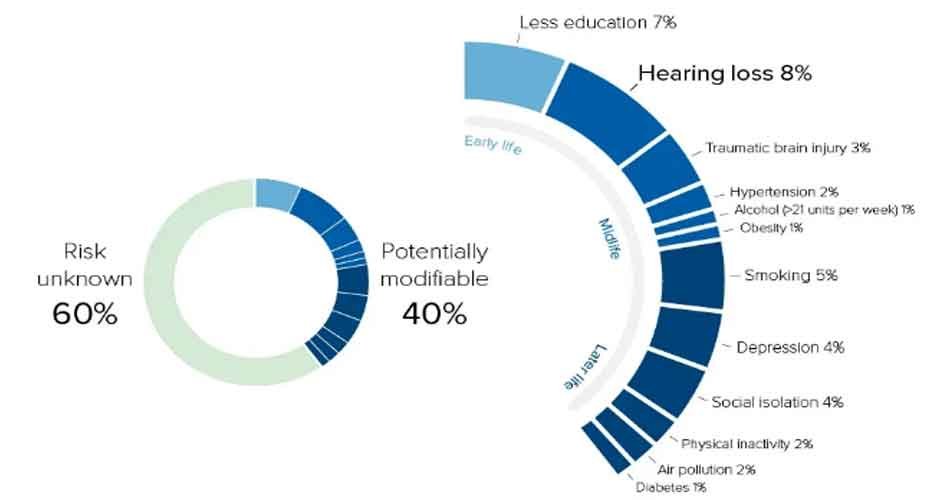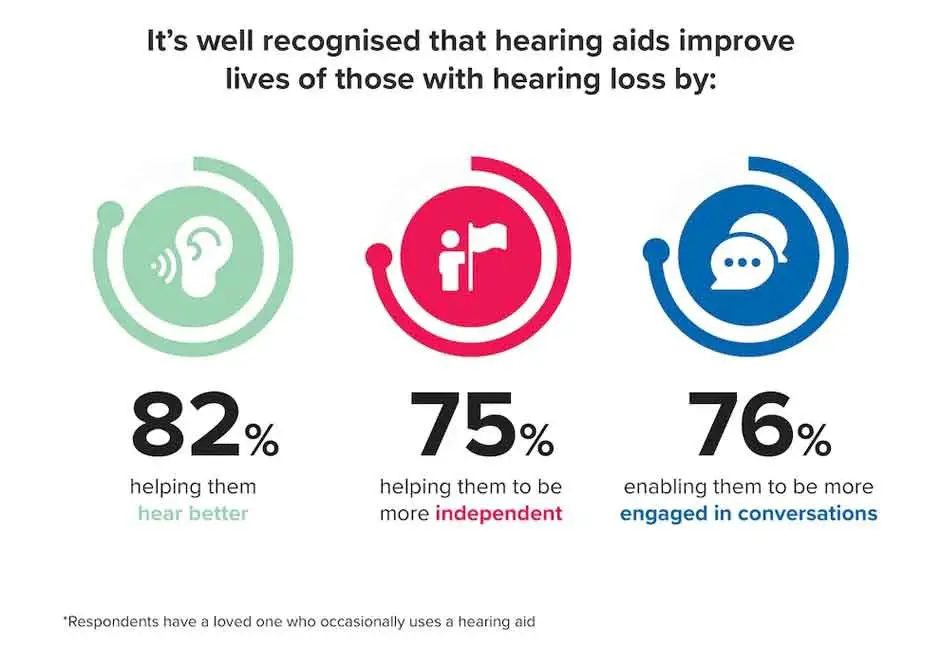
This article was written by Hearing Partners and The ENT Clinic.
Like many developed nations, Singapore’s population is ageing fast while fertility levels have declined. The proportion of Singapore residents who are older than 65 is projected to rise from 14% in 2015 to 32% in 2035, and a sobering 47% by 20501.
The prevalence of Singaporeans aged 60 and above with dementia is 10%2 and the number of people with dementia is projected to increase by more than five fold from 2015 to 2050 to hit 250,0003. The prevalence of dementia increases rapidly above the age of 65, with population prevalence in Europe hitting 22.5% in those aged ≥85 years4.
In this article, we discuss the signs and risk factors of dementia and how it relates to hearing loss.
Signs and Symptoms of Dementia
There are 4 categories of signs and symptoms of dementia, namely activities of daily living, behaviour, cognitive decline and disorientation5. As one’s condition progresses, the severity of the signs become more advanced.
Here are some examples you may observe in individuals with dementia of varying severities5:
| Activities of daily living | Behaviour | Cognitive decline | Disorientation | |
| Mild | ● Able to do basic activities of daily living e.g., personal grooming, feeding oneself
● May experience difficulty in taking public transport and preparing meals |
● Uninterested in activities they used to enjoy
● Quick mood changes |
● Short-term memory loss (signs of forgetfulness)
● Diminished judgement ● Difficulty in following conversations ● Difficulty finding the right words ● Misplacing items |
● Disoriented at times, but able to navigate between familiar places |
| Moderate | ● Assistance required with daily living
● Risk of falling |
● Repetitive actions and questions
● Sleep inversion ● Frustration from not being able to communicate well ● May seem depressed and easily agitated |
● Cloudy long-term memory
● Not able to recognise some family members ● Not able to remember one’s address ● Repetitive speech or inability to comprehend contexts |
● Confused with the concept of time
● Gets lost in familiar places |
| Advanced | ● Not able to care for oneself
● May have mobility issues |
● Crying or shouting
● Repetitive speech to communicate needs ● Refusing care due to confusion |
● Not able to recognise current self
● Not able to recognise everyday objects ● Not able to communicate through language; may be unresponsive |
● Not able to differentiate between day and night |
Risk Factors for Dementia

Retrieved from Hearing Partners: Hearing Loss in Singapore
There are certain risk factors that may contribute to the development of dementia. While 60% of the risks remain unknown, 40% of them are potentially modifiable6.
These are some of the potentially modifiable risk factors based on life stages6:
| Age group | Modifiable risk factors |
| Early life (<45 years) | Less education (7%) |
| Midlife (age 45–65 years) | Hearing loss (8%) |
| Traumatic brain injury (3%) | |
| Hypertension (2%) | |
| Alcohol (1%) | |
| Obesity (1%) | |
| Later life (age >65 years) | Smoking (5%) |
| Depression | |
| Social isolation | |
| Physical inactivity | |
| Diabetes | |
| Air pollution |
Hearing loss and dementia
Out of all the factors listed above, hearing loss is the most significant (8%)6. There are several theories to explain how hearing loss increases the risk of dementia.
Theory 1: Challenges with communication
Firstly, individuals with hearing loss experience more problems with communication which then leads to social isolation7. Many studies have demonstrated the close relationship between social isolation and dementia.
Theory 2: Depletion of cognitive reserves
Secondly, individuals with poor hearing have to utilise a disproportionate amount of their cognitive reserves to understand what others are saying; which then compromises their cognitive reserves for other day-to-day functioning like remembering things and recognising other people7.
How hearing loss is related to dementia
A study by Hopkins Medicine found that as compared to individuals with normal hearing, those with mild hearing loss are twice as likely to develop dementia.
By the time the hearing loss is moderate, they are 3 times as likely, and individuals with severe hearing loss have a dementia risk that is 5 times higher than those with normal hearing8.
How to Reduce the Risk of Dementia by Addressing Hearing Loss
Many risk factors such as family history and ageing cannot be changed but hearing loss is the most significant potentially modifiable risk factor that can be addressed to reduce the risk of dementia. Unfortunately, the majority of individuals with hearing loss in Singapore wait until their hearing loss is almost severe before seeking help9.
Hearing tests
Hearing tests allow you to identify any problems with your hearing early and seek treatment if necessary. Individuals with untreated hearing loss experience challenges with communication and social participation.
Delaying the diagnosis and treatment will mean delaying addressing the negative impacts of hearing loss which includes an increased risk of dementia. Spare 5 minutes to take a free online hearing test today.
Hearing aids
Hearing aids are devices that receive and amplify sounds from the environment for the wearer to hear better.
According to the Singapore National Health Survey, 2010, 73.2% of Singapore residents who had hearing loss bad enough to need hearing aid were not aware of their hearing loss and only 3.3% of them were wearing hearing aids10.

It is advised that individuals experiencing hearing loss wear hearing aids to manage their hearing health. In fact, a study by Hearing Partners11 has concluded that
- Hearing aids improve one’s quality of life by helping
- 82% of respondents hear better
- 75% of respondents to be more independent
- 76% of respondents to be more engaged in conversations
- 82% of respondents think that hearing aids are a worthy investment
Individuals with hearing aids benefit from enhanced communication with others. This reduces social isolation and excessive cognitive stress during communication, which then reduces the risk of dementia.
FAQs about Dementia and Hearing Loss
Is hearing loss a symptom of dementia?
Hearing loss is not a symptom of dementia. However, the two are commonly seen in older adults and the elderly and frequently coexist.
Individuals with both dementia and hearing loss will struggle with their communication and participation in family and social activities. Hence, the impact of dementia on patients and caregivers is likely to be greatly influenced by their hearing capabilities.
Can dementia worsen hearing loss?
Whilst there is no hard evidence that dementia can worsen hearing loss, we should not forget that dementia can make it harder to treat hearing loss. Those with advanced dementia will struggle to understand why they need hearing aids and will need more effort to get used to them.
Whilst wearing hearing aids for the first time is possible especially for those with milder dementia, a lot more effort is required by the patient, caregivers and hearing professionals. Hence, it would be much better for those with hearing loss to start wearing hearing aids before the onset of any cognitive decline.
Does wearing a hearing aid help with dementia?
For individuals who already have dementia, hearing aids can still enhance communication with others. This will help improve opportunities for social activities and social participation.
More importantly, better communication can also help ease caregiver burden and will likely slow down the progression of dementia.
Sources
- United Nations. World Population Prospects: The 2012 Revision 2013 https://population.un.org/wpp/Publications/Files/WPP2012_HIGHLIGHTS.pdf
- Subramaniam M, Chong SA, Vaingankar JA, Abdin E, Chua BY, Chua HC, et al. Prevalence of Dementia in People Aged 60 Years and Above: Results from the WiSE Study. J Alzheimers Dis. 2015;45(4):1127-38.
- Alzheimer’s Disease International. The Global Impact of Dementia: An analysis of prevalence, incidence, cost and trends London 2015 https://www.alz.co.uk/research/WorldAlzheimerReport2015.pdf
- Niu H, Álvarez-Álvarez I, Guillén-Grima F, Aguinaga-Ontoso I. Prevalence and incidence of Alzheimer’s disease in Europe: A meta-analysis. Neurología (English Edition). 2017;32(8):523-32.
- Agency for Integrated Care Pte Ltd. Signs And Symptoms Of Dementia https://www.aic.sg/body-mind/signs-symptoms-dementia
- Livingston G, Huntley J, Sommerlad A, Ames D, Ballard C, Banerjee S, et al. Dementia prevention, intervention, and care: 2020 report of the Lancet Commission. The Lancet. 2020;396(10248):413-46. https://www.thelancet.com/article/S0140-6736(20)30367-6/fulltext
- Lin FR, Metter E, O’Brien RJ, Resnick SM, Zonderman AB, Ferrucci L. Hearing loss and incident dementia. Arch Neurol. 2011;68(2):214-20. https://www.ncbi.nlm.nih.gov/pmc/articles/PMC3277836/
- John Hopkins Medicine. Hearing Loss and Dementia Linked in Study 2011 https://www.hopkinsmedicine.org/news/media/releases/hearing_loss_and_dementia_linked_in_study
- Eu Chin Ho, HanYu Zhang, Warren Ming Wu Ong, KeXin Li, Yen Tze Eileen Bei, Satya Vijay Reddy Medapati & Aruni Seneviratna (2018) Hearing impairment and hearing aid usage in Singapore, International Journal of Audiology, 57:4, 291-301, DOI: 10.1080/14992027.2017.1420921 https://doi.org/10.1080/14992027.2017.1420921
- Ministry of Health Singapore. National health survey 2010. In: Epidemiology and Disease control Division MoHS, editor. Singapore: Ministry of Health Singapore; 2011.
- Hearing Partners Singapore. 5 Statistics That Show How Hearing Aids Can Improve Your Relationships 2022 https://www.hearingpartners.com.sg/hearing-aids-improve-relationships/

